Results
-
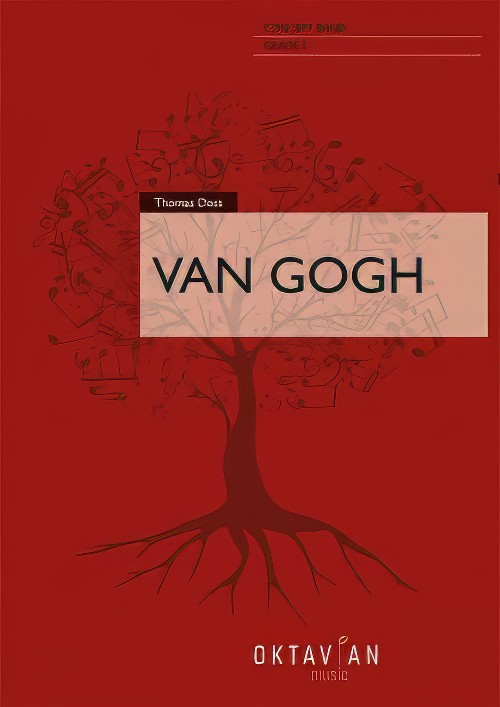 £279.99
£279.99Van Gogh (Concert Band - Score and Parts) - Doss, Thomas
This composition is not a work inspired by the life of the famous painter, but rather an attempt at a pictorial immersion into his world. In addition to Van Gogh's character and tragic life, the technique he employed to create his works, the bright colours of his paintings and his view of nature served as inspiration for this musical work. Point by point, stroke by stroke, Van Gogh brought his own world to life on canvas.On the life of Van Gogh: The Dutch artist Vincent van Gogh was one of the most important pioneers of Modernism, despite being relatively unknown during his own lifetime. As an artist, he chose a life of poverty and seclusion. From today's perspective, his important woks were created from 1880 onwards, when he had already more or less succumbed to madness. While his earlier works could still be classed as contemporary, he matured into a pioneer of Expressionism with his later work indicating an increasing self-awareness. He was just 37 years old when he died but he created over 750 paintings and 1600 drawings in the last ten years of his life.The structure of the work:Start: Brushes and Paints: Van Gogh retired to Arles in southern France where he found his artistic home. The colours and flowering gardens of this landscape awakened in him an unbelievably great creative power.A: A Picture Comes into Being: Van Gogh's psychotic episodes and bouts of depression did not stop him from painting wonderful pictures. Hardly anyone recognised his genius during his lifetime, on the contrary, he often felt misunderstood.C: Paris - Arles: In Paris (from 1886), Van Gogh became inspired by the French art scene. His works found few takers, however. He met and befriended the painter Paul Gauguin, but the lack of success made Van Gogh short tempered, and he began to drink. Eventually, he moved from Paris to Arles in the south of France to establish an artists' collective with Gaugin. Within a few weeks, the two got into such a violent argument that Van Gogh attacked his friend with a knife. The friends parted ways and afterwards Van Gogh cut off his right ear. In 1889 he voluntarily admitted himself into a mental hospital at St. Remy, suffering from hallucinations and fearing that he would lose his mind.G: The Starry Night One of his most famous paintings, created in 1898.H: Death and Brotherly Love Vincent van Gogh accepted an invitation to Auver-sur-Oise in 1890. This was one of his most intensive creative periods. He also went there for treatment, but his mental state hardly improved. After an extended walk, he injured himself fatally with a pistol under mysterious circumstances. Not even to his beloved brother Theo, who had supported him all his life, did he reveal on his deathbed how the accident had occurred.J: Art Market Today, Van Gogh's paintings are among the most expensive paintings on the art market. How ironic, given that he could hardly sell a painting during his lifetime. "I put my heart and soul into my work and lost my mind in the process." (Vincent van Gogh)Duration: 13.15
Estimated dispatch 7-14 working days
-
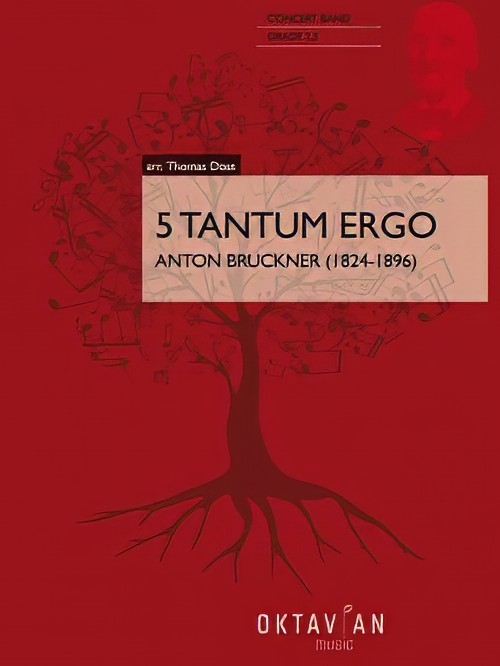 £95.99
£95.995 Tantum Ergo (Concert Band - Score and Parts) - Bruckner, Anton - Doss, Thomas
Anton Bruckner (b. 4.9.1824, Ansfelden, d. 11.10.1896, Vienna) didn't have it easy. Throughout his life, the Austrian composer was plagued by self-doubt. Anton Bruckner came from a simple, rural background. After the death of his father, he was accepted as a choirboy at the monastery of Sankt Florian in 1837. After several years as a school assistant and his own organ and piano studies, he first worked as organist in St. Florian, then from 1855 as cathedral organist in Linz. Introduced to music theory and instrumentation by Simon Sechter and Otto Kitzler, he discovered Richard Wagner as an artistic role model, whom he admired throughout his life and also visited several times in Bayreuth. In 1868 Anton Bruckner became professor of basso continuo, counterpoint and organ at the Vienna Conservatory; ten years later court organist; and in 1891 finally honorary doctor of the University of Vienna. He was considered an important organ virtuoso of his era, but had to wait a long time for recognition as a composer. It was not until Symphony No.7 in E major, composed between 1881 and 1883, with the famous Adagio written under the effects of Wagner's death, that he achieved the recognition he had hoped for, even if he was reluctant to accept it given his inclination towards scepticism and self-criticism. Anton Bruckner was a loner who did not want to follow a particular school or doctrine. He composed numerous sacred vocal works, such as his three masses, the Missa Solemnis in B flat minor (1854), the Te Deum (1881-84) and numerous motets. As a symphonic composer, he wrote a total of nine symphonies and many symphonic studies from 1863 onwards, tending to revise completed versions several times over. Bruckner's orchestral works were long considered unplayable, but in fact were merely exceptionally bold for the tonal language of their time, uniting traditions from Beethoven through Wagner to folk music, on the threshold between late Romanticism and Modernism. Hymns for four-part mixed choir a cappella (1846, St. Florian) No. 1 in E flat major (WAB 41/3): Quite Slow No. 2 in C major (WAB 41/4): Andante No. 3 in B flat major (WAB 41/1): Slow No. 4 in A flat major (WAB 41/2): Slow Hymn for five-part (SSATB) mixed choir and organ No. 5 in D major: Solemnly They are simple works, completely subordinate to their liturgical use, which nevertheless already show numerous characteristics of personal expression. These small pieces were able to stand up to the harsh scrutiny of the mature master: in 1888, Bruckner subjected them to a revision in which he made only minor corrections.Duration: 11.00
Estimated dispatch 7-14 working days
-
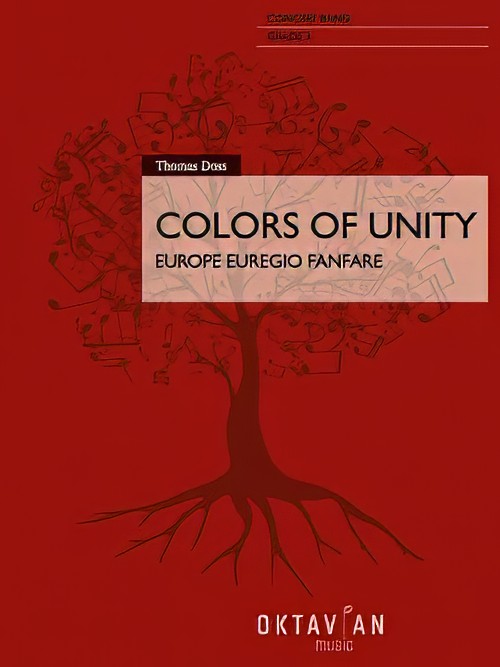 £75.99
£75.99Colors of Unity (Concert Band - Score and Parts) - Doss, Thomas
Europe Euregio FanfareLocated in the heart of Europe, this Euroregion unites the three provinces of Tyrol, South Tyrol and Trentino into a prosperous and successful union. People, points of view, interests and opportunities are to be joined together here in a harmonious future. For this part of Europe, our fanfare will be a signal that can be heard from far and wide.Duration: 2.00
Estimated dispatch 7-14 working days
-
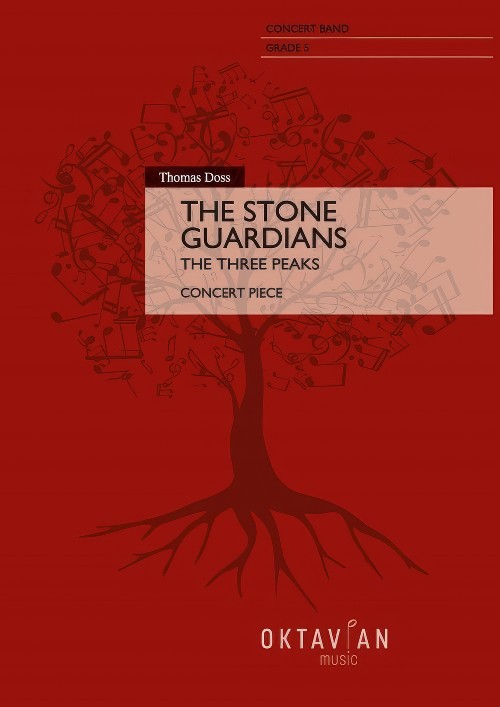 £242.99
£242.99The Stone Guardians (The Three Peaks) (Concert Band - Score and Parts) - Doss, Thomas
The Three Peaks (Italian: Tre Cime di Lavaredo) are a prominent massif in the Dolomites on the border between the Italian provinces of Belluno in the south and South Tyrol in the north. The imposing rock formations formed over 200 million years ago and represent one of the most recognizable landmarks of the Dolomites and South Tyrol (I). Due to their exceptional beauty, the Dolomites with the Three Peaks are dignified as a UNESCO World Heritage Site since 2009. The call of the Three Peaks attracts numerous visitors every year, who will experience an unforgettable and impressive spectacle of changing colours from cool grey to glowing red. The Three Peaks tower over the eventful contemporary history of Tyrol and South Tyrol like stone guardians.Duration: 15.00
Estimated dispatch 7-14 working days
-
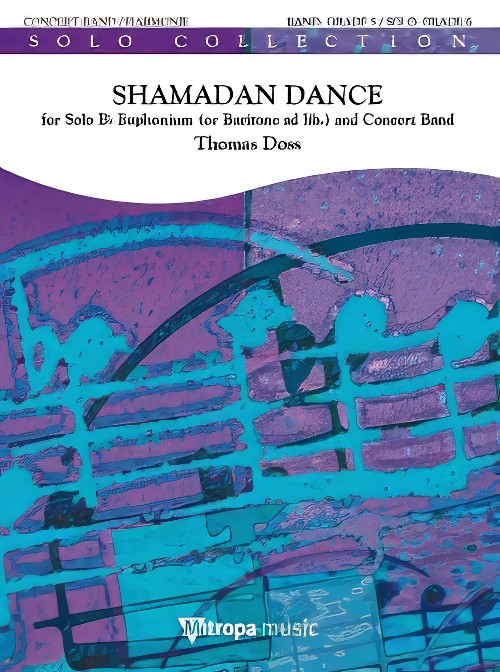 £124.99
£124.99Shamadan Dance (Euphonium Solo with Concert Band - Score and Parts) - Doss, Thomas
The Shamadan is an old oriental folk dance full of symbolism in which a female dancer, often on the occasion of a wedding, balances a candelabra on her head as a token of spiritual light. In this work, the euphonium takes up the role of the dancer. At the very beginning, the soloist already has the opportunity to shine in an unaccompanied recitative. Next, the soloist and band alternate, and in the course of the work the band also plays an important part with various technical highlights. More variation is created with a solo passage accompanied by percussion and hand claps, culminating beautifully in a grand tutti towards the end of the piece. Challenging music with much to enjoy! Duration: 8.30
Estimated dispatch 7-14 working days
-
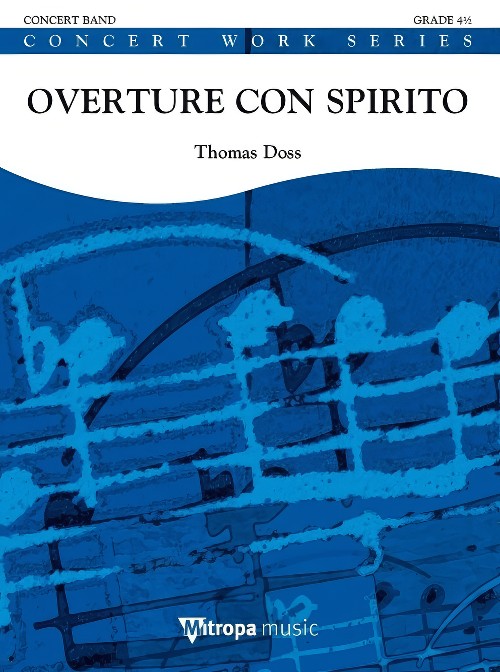 £99.99
£99.99Overture Con Spirito (Concert Band - Score and Parts) - Doss, Thomas
This work was commissioned by the Musikverein Prechtal e. V. (Germany) for its 100th anniversary in the year of 2021. The composition opens with a powerful rhythmic motif, which soon develops into the main theme of this brisk overture. The unwavering, joyful melodies and a positive atmosphere give the work a high-spirited energy. The strong pulse has the music firmly in its grasp and only quietens gradually in a pensive middle movement that seems to emanate from another world. This atmospheric passage can evoke dreamy thoughts and a variety of visions. But then the liveliness of the previous motifs returns, to take us back to the vivacious here and now, full of optimism and determination for the hundred years to come. On to a wonderful future! Duration: 8.45
Estimated dispatch 7-14 working days
-
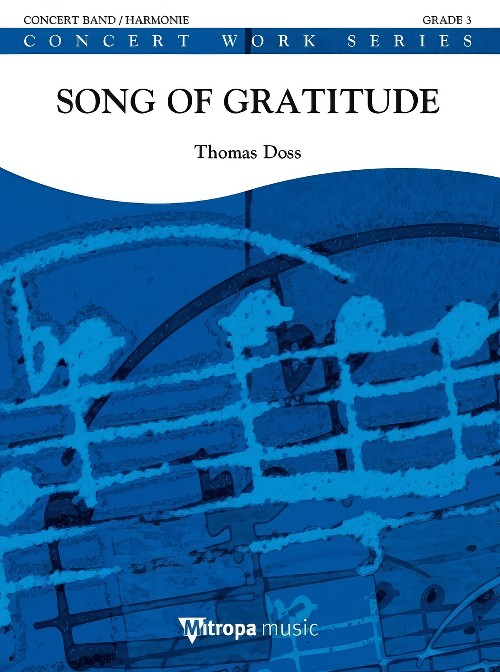 £69.99
£69.99Song of Gratitude (Concert Band - Score and Parts) - Doss, Thomas
Song of Gratitude was written for an old friend. Many friendships that start off at a young age last for life and thus form a sort of connecting thread throughout one's existence. In this particular work, this notion is mirrored in a short motif that expands more and more and becomes more passionate until it finally settles down in a thankful closing passage. Duration: 4.00
Estimated dispatch 7-14 working days
-
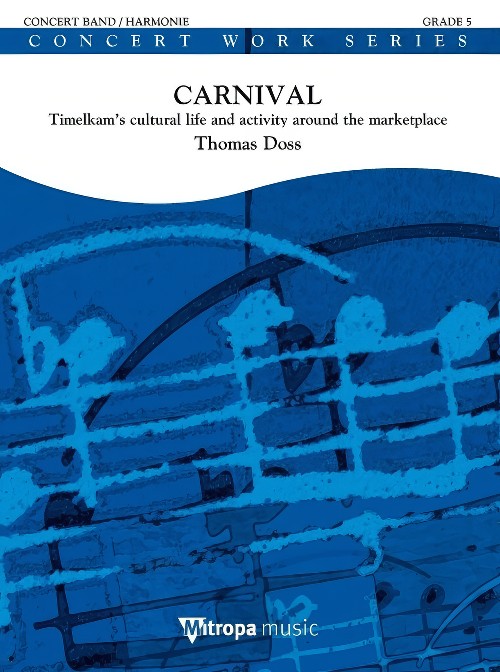 £159.99
£159.99Carnival (Concert Band - Score and Parts) - Doss, Thomas
This work was commissioned by Marktmusik Timelkam to celebrate its 170th anniversary. It describes the cultural life and hustle and bustle of the band's home base, the Austrian town of Timelkam. Carnival pictures a festive procession starting at the marketplace and lasting well into the night. The work features many carnivalesque elements and is a joy for players to perform. There is a lot of merry activity going on in the music; people cheerily chatting in the inn; singing and dancing together and having fun. There is also room for a melancholy mood, accompanied by reminiscences about eternal goodbyes and searching for love. With the added musical representation of children's playing and pranks, a beautiful sunrise as well as a depiction of the churches and societies in town, this composition is not just an account of a carnival parade but a small portrayal of life.Duration: 11.30
Estimated dispatch 7-14 working days
-
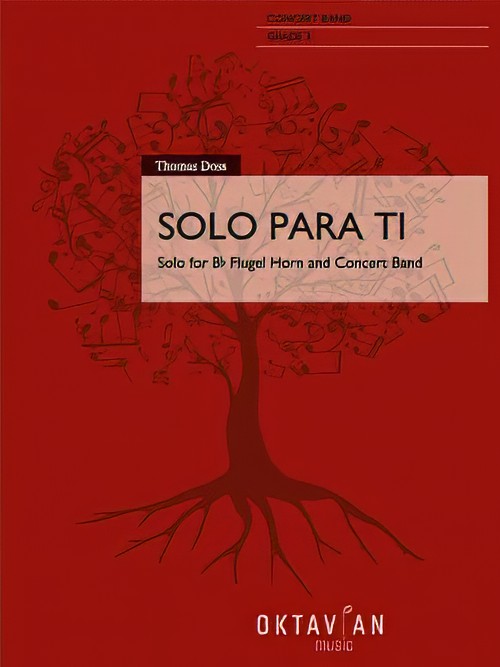 £71.99
£71.99Solo Para Ti (Flugel Horn Solo with Concert Band - Score and Parts) - Doss, Thomas
Solo Para Ti is a calm and expressive composition for Bb Flugel Horn solo, which can optional be played with English Horn, Eb Alto Saxophone or Bb Trumpet. This work was commissioned by the Blaservereinigung Albachten 1921 in honour of its conductor Philip Watts.Duration: 4.30
Estimated dispatch 7-14 working days
-
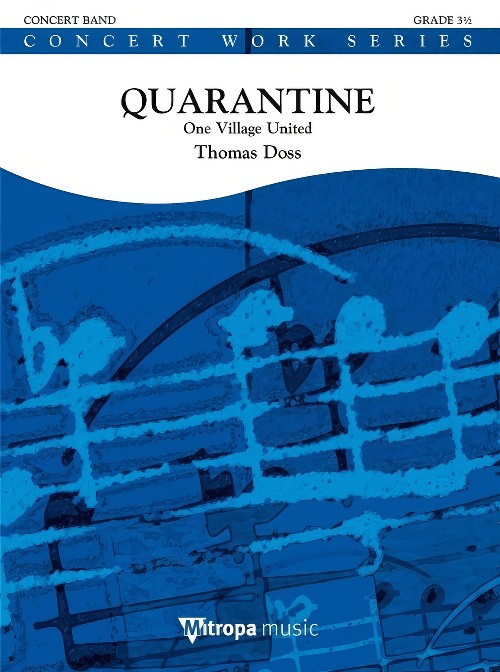 £119.99
£119.99Quarantine (One Village United) (Concert Band - Score and Parts) - Doss, Thomas
Like a dark veil, an ominous sense of foreboding takes hold across the world. A looming danger, one previously unknown to mankind, slowly approaches, bringing our daily lives to a grinding halt. A perilous virus gives us no choice other than to stay in our homes, leaving us unable to work in our offices or even visit family and friends. Something that has only been talked about in history books is coming to pass: a pandemic! The invisible danger expands more and more, and we feel paralysed by fear and fright. The distance between us and our fellow human beings increases. At the same time, we start to better understand something crucial: we have time again! People help each other out. Neighbourly assistance and support within one's own family becomes more apparent. We stand by each other. Suddenly we have the time for things that we did not have before. Time for reflection... A new era commences. Finally, hope reappears. We leave our houses, but nothing is quite the same anymore. With renewed strength, people begin to perceive the future in a positive and optimistic way once again. With greater attention and awareness of the here and now, we feel that, despite it all, we can be happy. Duration: 8.00
Estimated dispatch 7-14 working days
